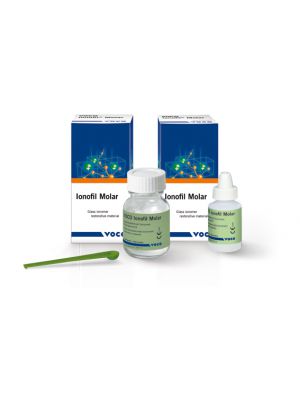Bonding agents
- Voco Ionoseal Syringe Refills
From ₹2515
As low as ₹2515
Ready-for-use one-component materialTime-saving: light-curing in secondsOut of StockVoco Meron Application CapsulesFrom ₹950
As low as ₹903
Low solubility in mouthLow acidityOut of StockVoco Meron Plus Liquid/ Powder RefillsFrom ₹2200
As low as ₹2097
Low solubility in mouthLow acidityOut of StockVoco Meron Plus AC - Application CapsulesFrom ₹632
As low as ₹632
Spreadable consistencyGood transluncencyOut of StockVoco Ionolux Powder-Liquid Shade A2From ₹1195
As low as ₹1195
Very good packabilityNon-sticky consistencyOut of StockBuy Dental Bonding Agents Online in India
BONDING AGENTS:
During the early 20th century, dental bonding consisted of various methods to create mechanical retention between the tooth and the restorative material. This included the undercut cavity preparation in amalgam restorations and other forms of physical retention such as grooves, skirts and slots. In the late 1950s, Dr. Michael Buonocore, discovered that phosphoric acid, in the concentrations around 37%, can be used to etch the tooth surfaces to create minute porosities, which can be used to create a micromechanical form of retention to the resin based composite restorative material.
Thus began the era of adhesive bonding in dentistry which is associated with the field of esthetic dentistry.
What are the different types of dental bonding agents?
TOTAL ETCH ADHESIVES:
The first bonding systems involved three steps : Etching of the enamel and dentin followed by rinsing and air drying; Application of a primer to prepare the tooth surface and application of the adhesive and light curing to facilitate formation of resin tags. This was called the Total Etch System of dental bonding.
37% orthophosphoric acid as reported by Buonocore is used to etch the tooth surface. After this step the tooth clinically shows a frosty white appearance in the applied regions.
Further research resulted in incorporation of the primer and adhesive in a single bottle, making it a two step process (5th generation bonding agents)
SELF ETCH ADHESIVES:
The problem associated with the total etch system of dental bonding was that the enamel and dentin react differently to the action of the acid and that it was very technique sensitive. The dentin if over dried resulted in desiccation which is highly detrimental to bonding. To overcome the problems associated with the total etch adhesive system, self etch adhesives were developed. These bonding agents were introduced as the 6th generation of bonding agents, which consisted of two components. The first was a bottle was the self etching primer and the second, the adhesive. This reduced the number clinical steps in the the treatment procedure and reduced the time taken. Taking it a step further the 7th generation bonding agents were invented as a single component system. The etchant, primer and adhesive were developed as a single bottle assortment.
A new technique of bonding, the hybrid technique is being used by dentists, which makes use of both systems. The total etch technique is used for the enamel surfaces while the dentin surfaces are bonded using the self etch technique.
What are the ideal requirements of dental bonding agents?
- High bond strength to dentin similar to that of enamel
- Biocompatibility
- Minimize and prevent microleakage at the restoration margins
- Be minimally technique sensitive
- Have an adequate shelf life
- Compatibility with a wide range of composite resins
- Be non toxic and sensitizing to the dentist and the patients
- Should seal the tooth surfaces from the fluids of the oral cavity
Why buy bonding agents products online from PinkBlue.in?
PinkBlue aims at delivering quality dental products to dentists enchancing the whole experience of clinical dentistry. Over 30 brands sell bonding agents online at our website. It is of monumental importance to us that the products are 100% original and genuine, and care is taken to ensure the same. In addition to having the best prices for dental materials online, at PinkBlue you have different modes of payment such as Cash on Delivery (CoD), Credit card, Debit card and Net Banking to suit the dentist.
What are the brands selling bonding agents online?
At PinkBlue you can find the best brands selling bonding agents at the best prices ensuring value for your money. 3M ESPE, Anabond Stedman, DMG Germany, Heraeus Kuzler, Ivoclar Vivadent, Kerr, Pulpdent, Tokuyama, Ultradent and Voco are a few of the 30+ brands selling their bonding agents through PinkBlue.





















